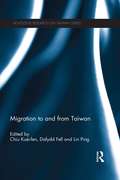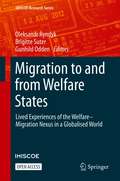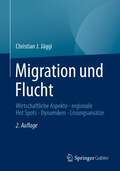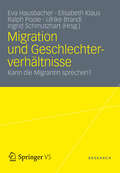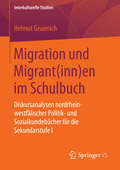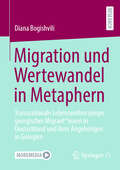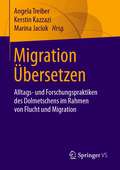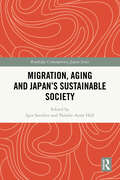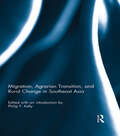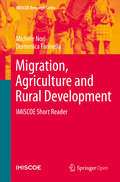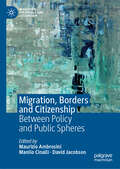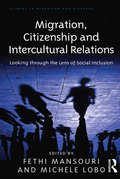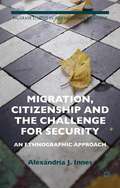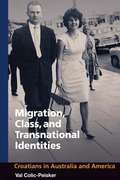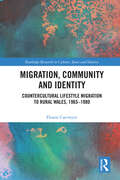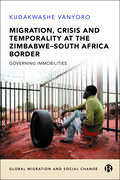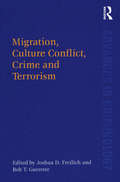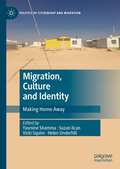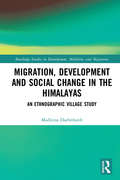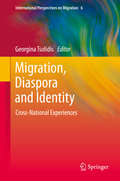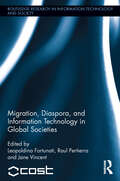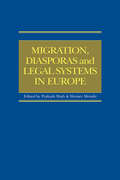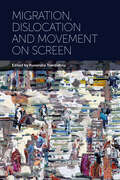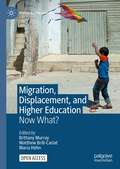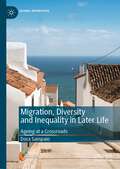- Table View
- List View
Migration to and From Taiwan (Routledge Research on Taiwan Series)
by Dafydd Fell Chiu Kuei-Fen Lin PingMigration has transformed Taiwanese society in the last 20 years. The main inflows have been temporary workers from Southeast Asian countries and female spouses from Southeast Asia and China marrying Taiwanese husbands. The main outflow has been migration to China, as a result of increased economic integration across the Taiwan Strait. These changes have significantly altered Taiwan’s ethnic structure and have profound social and political implications for this new democracy. As large numbers of these migrants take Taiwanese citizenship and their offspring gain voting rights, the impact of these "new Taiwanese" will continue to increase. This book showcases some of the leading researchers working on migration to and from Taiwan. The chapters approach migration from a range of disciplinary perspectives, including international relations, sociology, social work, film studies, political science, gender studies, geography and political economy and so the book has great appeal to scholars and students interested in the politics of Taiwan, Taiwanese society and ethnic identity as well as those focusing on migration in East Asia and comparative migration studies.
Migration to and from Welfare States: Lived Experiences of the Welfare–Migration Nexus in a Globalised World (IMISCOE Research Series)
by Brigitte Suter Oleksandr Ryndyk Gunhild OddenThis open access book explores the role of family, public, market and third sector welfare provision for individual and households’ decisions regarding geographical mobility. It challenges the state-centred approach in research on welfare and migration by emphasising migrants’ own reflections and experiences. It asks whether and in which ways different welfare concerns are part of migrants’ decisions regarding (or aspirations for) mobility. Employing a transnational and a translocal perspective, the book addresses different forms of geographical mobility, such as immigration, emigration, and re-migration, circular and return migration. By bringing in empirical findings from across a variety of Western and non-Western contexts, the book challenges the Eurocentric focus in current debates and contributes to a more nuanced and more integrated global account of the welfare-migration nexus.
Migration und Flucht: Wirtschaftliche Aspekte - regionale Hot Spots - Dynamiken - Lösungsansätze
by Christian J. JäggiDieses Fachbuch ordnet die hochaktuelle Fluchtthematik in größere theoretische Zusammenhänge ein. Dabei werden die wichtigsten globalen Fluchtbewegungen und Migrationsrouten und regionale Hot Spots skizziert, und zwar aus europäischer und insbesondere aus schweizerischer Sicht. Für Migration und Flucht gibt es ökonomische Ursachen, aber auch Krieg, Gewalt und Naturkatastrophen führen dazu, dass eine wachsende Zahl von Menschen ihre Heimat verlässt. Neben Fragen des Überlebens sind oft auch der Wunsch nach einem besseren Leben die Motivation dazu. Im Gegensatz zu früheren Darstellungen der Migrationsforschung geht der Schweizer Autor Christian J. Jäggi nicht von linearen Migrationsverläufen, sondern von gleichzeitigen, bilokalen Lebensformen aus. Die ökonomischen Implikationen von Migration und Flucht sowohl für die Migranten als auch für die Herkunfts- und für die Einwanderungsländer werden dargestellt. Zudem werden internationale und globale Strategien und Lösungsansätze analysiert.
Migration und Geschlechterverhältnisse
by Elisabeth Klaus Ingrid Schmutzhart Ulrike Brandl Ralph J. Poole Eva Hausbacher"Can the subaltern speak?" fragt Gayatri Spivak in einem der Schlüsseltexte postkolonialer Theorie. Ihre Antwort darauf ist wenig optimistisch: Die "fremde" Frau bleibe immer lediglich Repräsentierte und besitze als diese "Andere" keine Stimme. Die AutorInnen untersuchen das Phänomen der Migration in seinen geschlechtsspezifischen Zusammenhängen aus interdisziplinärer Perspektive. Sie diskutieren die vielfältigen Verschränkungen von kultureller Differenz und Geschlechterdifferenz. Dabei werden Fragen der Intersektionalität ebenso beleuchtet wie die Entwicklung von multi- über inter- zu transkulturellen Perspektiven und die vielfältigen Zusammenhänge von Mobilität und Gender.
Migration und Migrant(inn)en im Schulbuch
by Helmut GeuenichSchulbücher filtern - wie andere Massenmedien auch - Informationen über Gesellschaft und Politik. Sie erreichen über die Schule und den Unterricht Kinder und Jugendliche in großer Zahl und beeinflussen das Bewusstsein vieler Menschen. Insofern kann eine Analyse der Darstellung von Migration und Migrant(inn)en in Schulbüchern einen wichtigen Beitrag zur Erklärung der Einstellung vieler Bundesbürger zu entsprechenden Themen leisten. Eine derartige Untersuchung erscheint auch deshalb von Bedeutung, weil Schulbücher in dieser Hinsicht im Unterschied zu anderen Medien (Fernsehen / Zeitungen) selten, für Nordrhein-Westfalen noch nie, wissenschaftlich erforscht wurden.
Migration und Wertewandel in Metaphern: Transnationale Lebenswelten junger georgischer Migrant*innen in Deutschland und ihrer Angehörigen in Georgien
by Diana BogishviliDiese Studie untersucht den kulturellen Wandel in den Wertvorstellungen junger georgischer Migrant*innen in Deutschland und ihrer in Georgien verbliebenen Familienangehörigen und zeigt, wie diese Veränderungen ihre transnationalen Beziehungen beeinflussen. Die Ergebnisse geben tiefere Einblicke in die kulturellen Dynamiken von Migration und leisten so einen Beitrag zur aktuellen Migrationsforschung. Es wird deutlich, dass für viele Migrant*innen und ihre Familienangehörigen die Frage der Rückkehr ins Herkunftsland in den Hintergrund tritt, während der Aufbau einer funktionierenden transnationalen Lebenswelt, die von Identität, Zugehörigkeit und Familienbeziehungen geprägt ist, in den Vordergrund rückt. Die Studie wendet eine systematische Perspektiven-Triangulation an, die verschiedene Methoden und theoretische Ansätze kombiniert. Die Analyse basiert auf der kognitiven Metapherntheorie und ist in einem phänomenologisch-hermeneutischen Kontext verankert. Die Ergebnisse wurden im Rahmen einer biographisch orientierten, multi-sited Ethnografie mit dokumentarischer Methode und Metaphernanalyse erzielt. Die Studie leistet einen wichtigen Beitrag zur sozialtheoretischen Literatur mit Fokus auf transnationale Migration, indem sie das Verständnis kultureller Dynamiken vertieft.
Migration Übersetzen: Alltags- und Forschungspraktiken des Dolmetschens im Rahmen von Flucht und Migration
by Kerstin Kazzazi Angela Treiber Marina JaciukFür zahlreiche berufliche Praxis- und Forschungsfelder gilt, dass Gespräche nicht mehr in der Erstsprache der jeweiligen Beteiligten geführt werden können. Die zunehmende Vielfalt von Sprachen, von Multi- und Translingualität verlangen die Einbindung von Sprachmittler_innen/Dolmetscher_innen. In den Zusammenhängen von Flucht, Asyl und Migration diskutiert dieser interdisziplinäre Band unterschiedliche Verfahrensstrategien zur Überwindung sprachlicher wie auch kulturell bedingter Kommunikationsbarrieren und zeigt die entstehenden methodischen und theoretischen Herausforderungen für die soziale Beratungs- und Therapiepraxis wie für die Praxis qualitativer Forschung auf.
Migration, Aging and Japan's Sustainable Society (Routledge Contemporary Japan Series)
by Igor Saveliev Natalie-Anne HallThis book analyzes the relationship between migration and social sustainability in Japan and examines the transformation of its foreign-national and ethnic minority population over the past thirty years while critically assessing Japan’s immigration and integration policies and their domestic and inter-regional social effects.
Migration, Agrarian Transition, and Rural Change in Southeast Asia
by Philip F. KellyRural life in Southeast Asia is being transformed by new and intensifying processes of migration and mobility. Migration out of rural areas creates new forms of class mobility, familial relations, production processes and income. Migration into rural areas creates a new and sometimes marginalized workforce, contestation over resource access, and the juxtaposition of culturally different groups. At the same time, everyday mobility stretches the spatial boundaries of village and family life. The bounded space of the village is no longer adequate to understand the dynamics that are driving (and resulting from) rural social change.This collection of original studies explores the cultural, economic and environmental dimensions of intensifying migration and mobility in rural Southeast Asia at multiple scales. Diverse processes are explored including rural-urban flows, rural-rural movement, everyday mobilities, and international migrations into regional and global labour markets. Drawing on fieldwork in six countries across the region, these essays also explore what migration means for our understanding of class, citizenship, gender and the state in a rapidly changing part of the world.This book was based on two parts of a special issue of Critical Asian Studies.
Migration, Agriculture and Rural Development: IMISCOE Short Reader (IMISCOE Research Series)
by Domenica Farinella Michele NoriThis open access short reader looks into the dynamics which have reshaped rural development and human landscapes in European agriculture and the role of immigrant people. Within this framework it analyses contemporary rural migrations and the emergence of immigrants in relation to the incorporation of agrarian systems into global markets, the European agricultural governance (CAP), and the struggle of local territories as differentiated practices in constant stress between innovation and resilience. It specifically explores the case of immigrant shepherds to describe the reconfiguration of agriculture systems and rural landscapes in Europe following intense immigration and the related provision of skilled labour at a relatively low cost. Being written in a very accessible way, this reader is an interesting read to students, researchers, academics, policy makers, and practitioners.
Migration, Borders and Citizenship: Between Policy and Public Spheres (Migration, Diasporas and Citizenship)
by Maurizio Ambrosini Manlio Cinalli David JacobsonThis edited collection goes beyond the limited definition of borders as simply dividing lines across states, to uncover another, yet related, type of division: one that separates policies and institutions from public debate and contestation. Bringing together expertise from established and emerging academics, it examines the fluid and varied borderscape across policy and the public domains. The chapters encompass a wide range of analyses that covers local, national and transnational frameworks, policies and private actors. In doing so, Migration, Borders and Citizenship reveals the tensions between border control and state economic interests; legal frameworks designed to contain criminality and solidarity movements; international conventions, national constitutions and local migration governance; and democratic and exclusive constructions of citizenship. This novel approach to the politics of borders will appeal to sociologists, political scientists and geographers working in the fields of migration, citizenship, urban geography and human rights; in addition to students and scholars of security studies and international relations.
Migration, Citizenship and Intercultural Relations: Looking through the Lens of Social Inclusion (Studies in Migration and Diaspora)
by Michele LoboMigration, Citizenship and Intercultural Relations reflects on the tensions and contradictions that arise within debates on social inclusion, arguing that both the concept of social inclusion and policy surrounding it need to incorporate visions of citizenship that value ethnic diversity. Presenting the latest empirical research from Australia and engaging with contemporary global debates on questions of identity, citizenship, intercultural relations and social inclusion, this book unsettles fixed assumptions about who is included as a valued citizen and explores the possibilities for engendering inclusive visions of citizenship in local, national and transnational spaces. Organised around the themes of identity, citizenship and intercultural relations, this interdisciplinary collection sheds light on the role that ethnic diversity can play in fostering new visions of inclusivity and citizenship in a globalised world.
Migration, Citizenship and the Challenge for Security
by Alexandria J. InnesThis study focuses on the field of security studies through the prism of migration. Using ethnographic methods to illustrate an experiential theory of security taken from the perspective of migrants and asylum seekers in Europe, it effectively offers a means of moving beyond state-based and state-centric theories in International Relations.
Migration, Class and Transnational Identities: Croations in Australia and America
by Val Colic-PeiskerHarnessing concepts and theories from sociology, anthropology, and political science, this interdisciplinary study compares the vastly different experiences of two Croatian immigrant cohorts who have settled in the city of Perth in Western Australia. The populations explored represent an earlier group of working-class migrants arriving from communist Yugoslavia from the 1950s to 1970s and a later group of urban professionals arriving in the 1980s and 1990s as 'independent' or skills-based migrants. This latter group integrated into professional ranks but also used their Australian experience as a stepping stone in becoming part of a highly mobile global professional middle class. Employing a refined theoretical analysis, this rich ethnography challenges the domination of the ethnic perspective in migration studies and the idea of ethnic community itself. It emphasizes the importance of class, focusing on the intersection of class, ethnicity, and gender in the process of migration, migrant incorporation and transnationalism. In theorizing the connection of the two migrant cohorts with their native Croatia the study introduces concepts of "ethnic" and "cosmopolitan" transnationalism as two distinctive experiences mediated by class.
Migration, Community and Identity: Countercultural Lifestyle Migration to Rural Wales, 1965-1980 (Routledge Research in Culture, Space and Identity)
by Flossie CaerwyntMigration, Community and Identity analyses experiences of migration to rural Wales from 1965-1980. It focuses on people who were part of the era’s counterculture, looking for an escape from mainstream society. Using original interviews, the book shows why people moved and how the move shaped their lives and identities. Drawing together geographical and historical research, this book explores the significance of this migration phenomenon. It provides a unique insight into late 20th century Welsh society and shines a new light onto the counterculture itself. Through analysing the experience of life in Wales, and ongoing developments to the migrants’ sense of identity, it argues that rather than being a uniform group, the counterculture encompassed a diverse range of beliefs and aspirations. The book will be suitable for upper-level undergraduates and above, the broad range of themes covered in this book is relevant not only to rural and historical geographers and migration researchers, but also those interested in sociology, anthropology, and the modern history of Britain and Wales. The theories and concepts discussed have global appeal and will be of interest to those studying similar migration phenomena elsewhere.
Migration, Crisis and Temporality at the Zimbabwe–South Africa Border: Governing Immobilities
by Kudakwashe VanyoroOnly 15 kilometres away from the border of Zimbabwe, Musina is an obscure town in South Africa that the media cast into the public eye in the wake of the 2008 Zimbabwean economic crisis. Taking as its starting point the arrival of thousands of displaced Zimbabwean migrants at Musina, this book presents valuable new perspectives on the temporality of migration and the governance of immobilities. The author explores the role of humanitarian actors in supporting migrants and examines the outcomes of government-led activities in the longer term. This is an insightful assessment of how state and non-state practices intertwine in the management of largely immobile people, and of the importance of time in understanding African migration and borders.
Migration, Culture Conflict, Crime and Terrorism (New Advances in Crime and Social Harm)
by Rob T. GueretteImmigration and its consequences is a substantially contested subject with hugely differing viewpoints. While some contend that criminal participation by migrants is the result of environmental factors found in the host country that are beyond the control of migrants, others blame migrants for all that is wrong in their communities. In this book, experts from Europe, the USA, Turkey and Israel examine recent developments in the fields of culture conflict, organized crime, victimization and terrorism, all of which intersect to varying degrees with migration and illegal conduct. While the essays further our understanding of a variety of issues surrounding migration, at the same time they illuminate the complexities of managing the challenges as globalization increases.
Migration, Culture and Identity: Making Home Away (Politics of Citizenship and Migration)
by Suzan Ilcan Vicki Squire Yasmine Shamma Helen UnderhillThis book is about homemaking in situations of migration and displacement. It explores how homes are made, remade, lost, revived, expanded and contracted through experiences of migration, to ask what it means to make a home away from home. We draw together a wide range of perspectives from across multiple disciplines and contexts, which explore how old homes, lost homes, and new homes connect and disconnect through processes of homemaking. The volume asks: how do spaces of resettlement or rehoming reflect both the continuation of old homes and distinct new experiences?Based on collaborations with migrants, refugees, practitioners and artists, this book centres the lived experiences, testimonies, and negotiations of those who are displaced. The volume generates appreciation of the tensions that emerge in contexts of migration and displacement, as well as of the ways in which racial categories and colonial legacies continue to shape fields of lived experience.
Migration, Development and Social Change in the Himalayas: An Ethnographic Village Study (Routledge Studies in Development, Mobilities and Migration)
by Madleina DaehnhardtThis book teases out the reasons for, and the socio-economic impacts of, different types of migration on contemporary rural households and individuals. The author creatively depicts the dynamic microcosm of one village in the North Indian Kumaun Himalayas, near the border with Chinese Tibet, giving voice to the life stories of a range of migrants. Through this ethnography, migration is revealed as a fundamental part of the multifaceted 21st-century changes which the village is experiencing. From elderly women, to unemployed men, young farm women and local children, the book demonstrates how village life is continually constituted socially and economically by overlapping migration patterns – including outmigration, return migration, in-migration and even non-migration. Extending the argument, the author demonstrates that the village microcosm is linked to many other villages which are microcosms in their own right as well as in relation to the main village across a spatial hierarchy. The theoretical implications of the study are teased out to inform our understanding of rural-urban migration trends and impacts more generally, and as such the book will be of interest to researchers of the South Asian region but also of internal migration in the global context.
Migration, Diaspora and Identity
by Georgina TsolidisFramed in relation to diaspora this collection engages with the subject of how cultural difference is lived and how complex and shifting identities shape and respond to spatial politics of belonging. Diaspora is understood in a variety of ways, which makes this an eclectic collection of papers. Authors use various theoretical frameworks to explore diverse groups of people with a variety of experiences in a wide range of settings. They are making sense of the experiences of women and men from a range of ethnic backgrounds, negotiating identities through family, work and education. The micro dynamics of the everyday offer an evocative 'bottom up' means of understanding the tensions implicit in living multiple belongings. The common thread for the collection comes from the glimpses these authors provide into the remaking of our globalized world. The aim is to shed light on racism, dislocation and alienation on the one hand, and on the other hand, to consider how the complex power relations within the everyday mediate a sense of resistance and hope. The papers are arranged around four themes; 1. Multiple Belongings, 2. Representing a Way of Being, 3. Sexualised Identifications and 4. Marriage and Family.
Migration, Diaspora and Information Technology in Global Societies (Routledge Research in Information Technology and Society)
by Jane Vincent Leopoldina Fortunati Raul PertierraMigrants and diaspora communities are shaped by their use of information and communication technologies. This book explores the multifaceted role played by new media in the re-location of these groups of people, assisting them in their efforts to defeat nostalgia, construct new communities, and keep connected with their communities of origin. Furthermore, the book analyses the different ways in which migrants contribute, along with natives, in co-constructing contemporary societies – a process in which the cultures of both groups are considered. Drawing on contributions from a range of disciplines including sociology, anthropology, psychology and linguistics, it offers a more profound understanding of one of the most significant phenomena of contemporary international societies – the migration of nearly a billion people worldwide - and the relationship between technology and society.
Migration, Diasporas and Legal Systems in Europe
by Prakash Shah and Werner F. MenskiAt a time when issues concerning migration and the formation of diasporic communities have come to be critical for all European legal systems, this volume reflects, discusses and analyzes the questions raised by diasporas who have established themselves in Europe over more than fifty years of immigration and the challenges faced by legal systems in the light of continued migration. Contributors from a broad range of backgrounds address prominent issues ranging from legal pluralism among minorities, pressures on EU accession states, irregular migration, state control of family reunification and formation in light of human rights laws, challenges for citizenship and nationality laws and the implementation of visa rules and juxtaposed control zones. Besides the EU as a supranational legal order, the book contains discussion of conditions in the United Kingdom, Ireland, France, Spain, Gibraltar, Morocco, Greece, Turkey and Lithuania.This volume accompanies The Challenge of Asylum to Legal Systems and is the second book to emerge from the W.G Hart Legal Workshop held in 2004 at London's Institute for Advanced Legal Studies.
Migration, Dislocation and Movement on Screen
by Ruxandra TrandafoiuContemporary screen industries such as film and television have become primary sites for visualizing borders, migration, maps, and travel as processes of separation and dislocation, but also connection. Migration, Dislocation and Movement on Screen pulls case studies in film and television industries from throughout Europe, North Africa, and Asia to interrogate the nature of movement via moving images. By combining theoretical, interdisciplinary engagements with empirical research, this volume offers a new way to look at screen media's representations of our contemporary world's transnational and cosmopolitan imaginaries.
Migration, Displacement, and Higher Education: Now What? (Political Pedagogies)
by Maria Höhn Brittany Murray Matthew Brill-CarlatThis open access book is a nuanced introduction to Forced Migration Studies and a toolkit for faculty and undergraduate students, with a special emphasis on community-engaged learning. Experts from the social sciences, humanities, arts, and experimental sciences offer interdisciplinary perspectives to translate critical analysis into concrete action. The collection highlights activists, artists, and educators who have initiated projects in cooperation with and for the benefit of populations affected by migration and displacement. Together, these contributions powerfully articulate the relevance of the liberal arts and social sciences in preparing students to meet increasingly interconnected global challenges such as forced migration, climate change, and Covid-19.
Migration, Diversity and Inequality in Later Life: Ageing at a Crossroads (Global Diversities)
by Dora SampaioThis book is the first comprehensive ethnographic study of the diversity of living and ageing experiences of three groups of older migrants – return, lifestyle and ageing-in-place labour migrants – from a comparative perspective. It explores the motivations, ageing experiences and aspirations of transnational ageing migrants in the context of the Portuguese islands of the Azores and situates the research within debates of the ageing-migration nexus. The book’s interdisciplinary approach to transnational embodied and emplaced experiences of ageing facilitates a dialogue between various fields concerned with ageing and mobilities, including geography, anthropology, sociology, social gerontology, social work, and studies of health and wellbeing.
